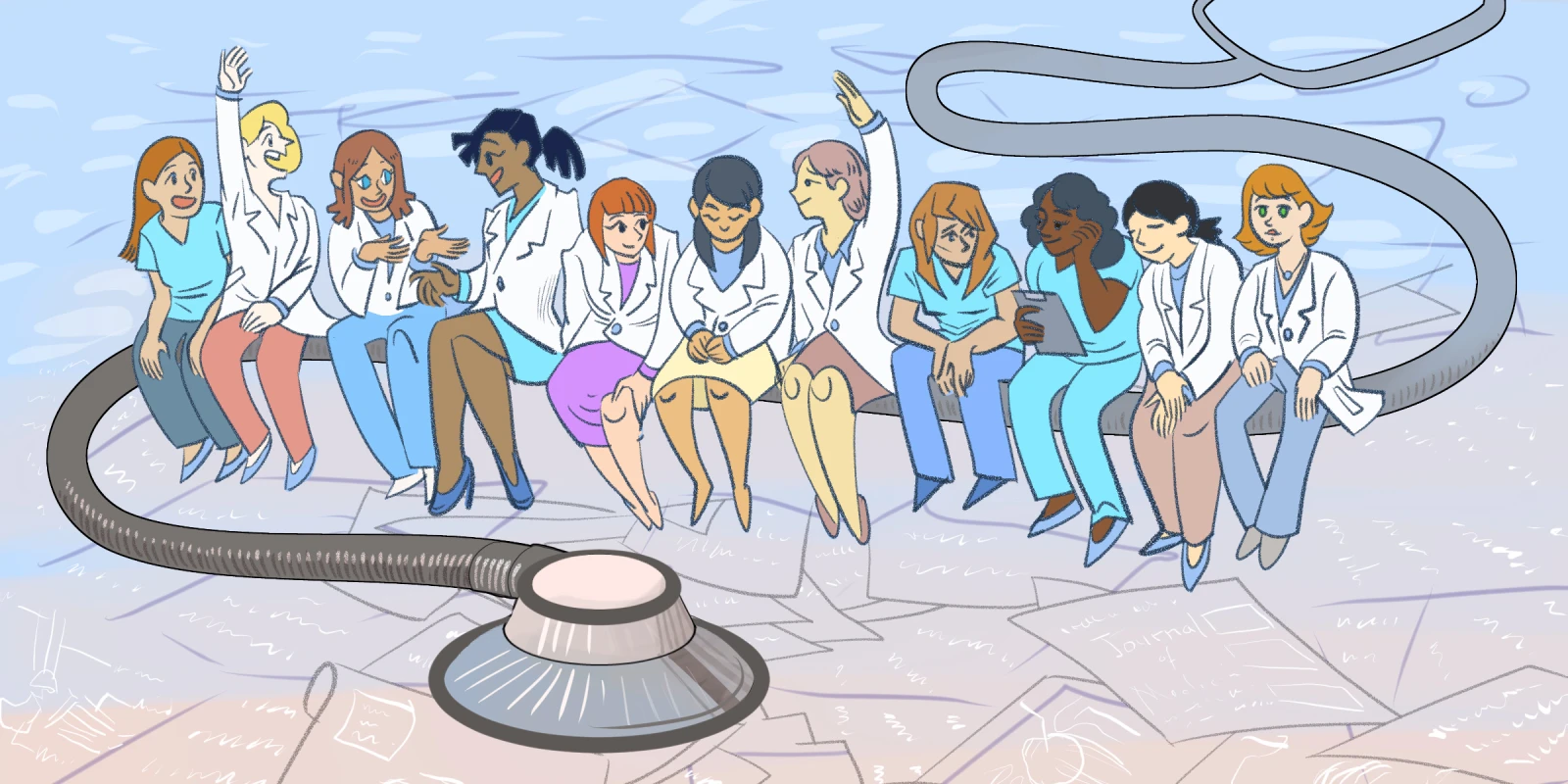Intern year. A freshly minted physician, I felt proud to wear my long white coat with “MD” embroidered on the front, and made sure my “MD” badge was facing forward when I walked into my first patient’s room. My head was held high — I was ready to be the most empathetic, educational, and thorough history taker intern this patient had ever seen. He was on the phone.
“Hang on, my nurse is here.”
“Hi, sweetie!” he exclaimed as he hung up the phone and looked toward me.
My heart sank. And yet, I was nowhere near surprised. I had had similar encounters already only months into being a doctor, and though I didn’t know it then, such dismissal would continue years into training — with this actually being one of the more innocent interactions. Like other women physicians, I’ve been hit on, harassed, yelled at, mistaken for every other health care role besides “doctor,” and not taken seriously by patients I’m trying to help.
In medicine, there is an added pressure on women to be “strong.” To work extra hard as a physician (while also being a perfect mom, wife, or daughter outside the hospital), and to exhibit resiliency when faced with microaggressions and inequality in the workplace. No matter how many years we’ve worked in clinical practice, there is still an underlying need to prove to those around us that we are capable.
As a trainee, the myriad sexist patients I encountered fueled my drive to be smarter and more assertive, and to exude less “femininity” in order to be taken more seriously. As a result, I pushed the idea of being a mother out of my head early in training. I was still young, and I knew I wanted to create a family at some point, but in a work environment where fertility and family planning were barely acknowledged, I felt the right thing to do was focus solely on being the best resident I could be. I became efficient at work, constantly trying to improve and make the best impression. I listened to medical podcasts on my commute, read journals after my shift, and became involved in research, quality improvement, and more. Outside of work I managed to maintain friendships and a social life, and appeared to “have it all together.”
Then, toward the end of residency, I heard about an attending in her ninth month of pregnancy who was on night shift, did several procedures, rounded the next day, and eventually returned home to her other kids. She had also given a lecture that first day and was heading several research projects and committees. There were whisperings around me — “Wow, she is so strong. A superhero.” There was that word, “strong” again. I wondered, Is this the path I’m headed on? Is that the life I am obligated to aspire to in order to gain respect from those around me? Should we really continue calling these women “strong” or “superheroes?” Doesn’t it highlight the fact that we work in a broken system where we are expected and pushed to work like this?
For so long, I had been consumed by career advancement — and all the anxiety, stress, and perfectionism that came with it. In so doing, I had lost a piece of myself. I had pushed away my creative interests, I had undervalued my feminine identity in the workplace, and I had avoided the decision of when to start a family.
After hearing about the pregnant attending, I finally decided to start trying to have a baby, despite worrying that I would be a burden as a pregnant physician, and would be taken less seriously by patients or peers.
It has now been a year since that moment. I have had countless labs, injections, procedures, doctor appointments, mental breakdowns, and no baby yet. Sadly, I am one of the many infertile physicians. There are numerous others like me — women colleagues who suffer through pregnancy complications or miscarriages, and still show up to work silent and “strong.” These days, I wish someone would have talked to me about fertility when I was still in medical school. I wish someone had told me that it’s OK to start a family during training. It’s OK to go through fertility treatment while being a doctor. It’s OK to ask for help when undergoing IVF procedures and self-injecting several times a day at work. It’s OK to not read up on your patients every single day. It’s OK to stand up for yourself, share your story, and put your family and health first.
I am proud to be a female physician, and have learned to embrace my whole identity. A striving mother, an infertility patient, wife, dancer, writer. Now when I encounter patients, I’m a physician, yes, but I’m also another human. I am at my job, trying to be the best version of myself I can be.
The more time I’ve spent in the medical workplace, the more I’ve come to see that being “strong” means acknowledging and accepting internal struggle as a physician, instead of suppressing it. Learning from mistakes and being OK with failure. Knowing we have only ourselves to prove things to, not others. Being cognizant of our limits. Understanding that our identity can be more than “doctor.” Using every encounter with patients as an opportunity to grow. Making sure our own well-being is addressed so we can take care of others to the best of our ability. Voicing our opinions to others and advocating for ourselves.
Though my intern year was only four years ago, so much has changed since those days of naïvety. Through this new lens, I now see strong female physicians everywhere around me.
How have you redefined strong for yourself? Share your thoughts and experiences in the comments below.
Arushi Hukku is a first year Pulmonary Critical Care and Sleep Fellow at Rush University Medical Center in Chicago. She has been navigating infertility and IVF and is passionate about spreading awareness of fertility in medicine, commenting on the cultural/workplace stigma, and sharing her story to help other female trainees who may be going through similar experiences via an Instagram page called @browninfertiledocs.
Illustration by April Brust







